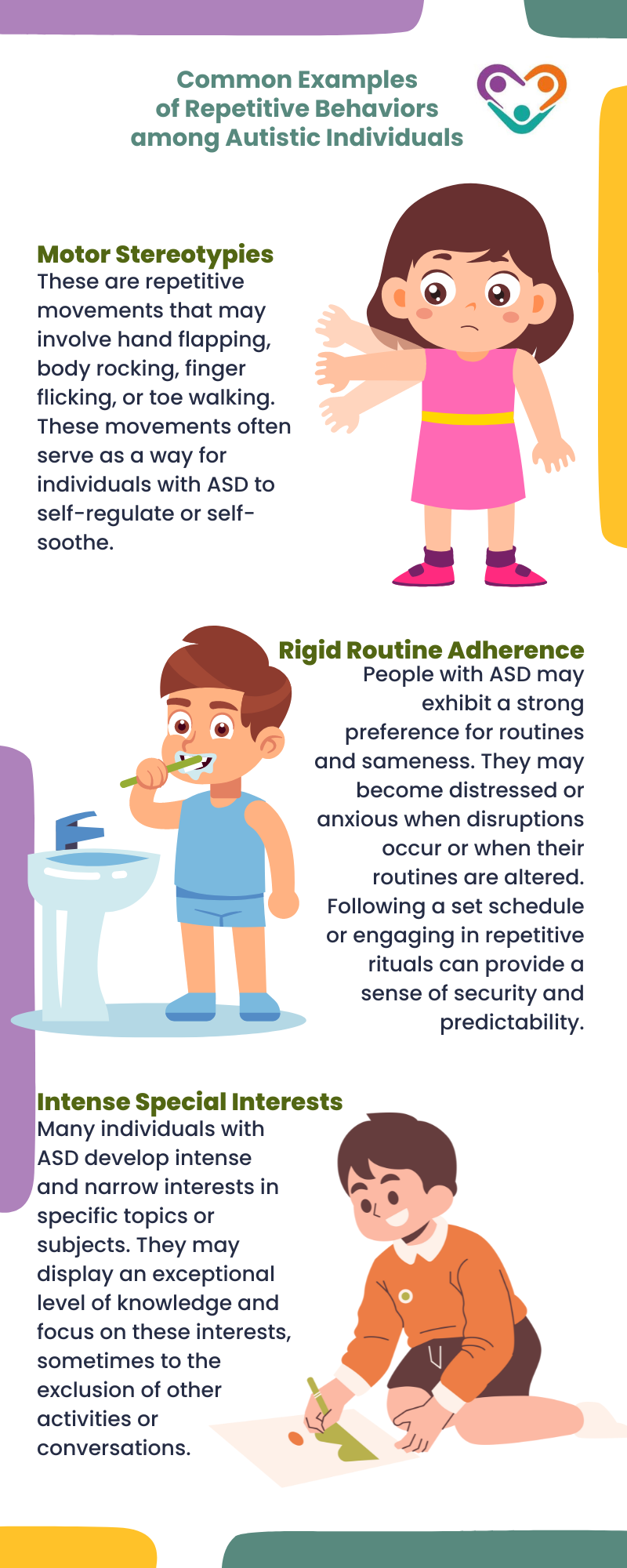With the help of Autism Behavioral Therapy, caregivers can enhance independence in daily routines
With the help of Autism Behavioral Therapy, caregivers can enhance independence in daily routines
Blog Article
Secret Symptoms And Signs to Identify in People With Behavioral Autism
When you run into someone with behavior autism, identifying key symptoms and signs is important. You may discover obstacles in social interactions and communication, as well as a strong requirement for routines. Additionally, sensory level of sensitivities can cause overwhelming experiences. Recognizing these traits can improve your support and treatments, but there's more to uncover regarding how these actions show up in everyday circumstances. Let's explore what these signs truly look like.
Challenges in Social Interactions
When you connect with someone on the autism range, you may notice they struggle with social signs and interaction. These challenges can make social communications feel overwhelming for them. You might see them preventing eye get in touch with or standing as well close or as well far away throughout discussions, which can develop misunderstandings. They may not select up on body language or facial expressions, making it harder for them to evaluate how others are really feeling.
In addition, you may locate that they choose routines and familiar settings, which can limit their determination to engage in new social situations. When they do engage, they might discuss their passions in fantastic detail without observing if you're interested. This can lead to prejudiced conversations that leave you feeling disconnected. Comprehending these challenges can assist you come close to interactions with compassion and perseverance, cultivating a more comfy setting for both of you.
Problem With Verbal and Non-Verbal Interaction

Identifying these indicators is necessary, as it helps you better support and engage with individuals on the autism range. By recognizing their interaction obstacles, you can foster extra purposeful links and offer a much more supportive atmosphere.
Repetitive Actions and Regimens
Communication obstacles frequently come with various other indicators of autism, such as repetitive actions and a solid preference for routines. You could notice that people with autism commonly take part in details, repetitive activities, like hand-flapping, rocking, or repeating expressions. These habits can give convenience and a sense of control in an usually overwhelming world.
When they adhere to a structured schedule,Routines are equally crucial; several individuals prosper. You may locate that adjustments to these regimens can bring about significant distress. If they have a daily routine of eating breakfast at a details time or adhering to a specific route to institution, any interruption can trigger stress and anxiety.
Identifying these patterns helps you comprehend their habits and give support. By suiting their demand for routine and allowing recurring actions, you can develop an extra comfortable setting that reduces their challenges.
Sensory Sensitivities

Typical Sensory Triggers
Sensory sensitivities can significantly affect life for people with autism, as certain stimulations typically set off overwhelming responses. Typical sensory triggers consist of loud noises, bright lights, and solid smells. You could see that unexpected audios, like alarm systems or alarms, cause stress and anxiety or distress. Similarly, fluorescent illumination in shops can feel uneasy and severe. Appearances can additionally play a significant function; harsh fabrics or particular food structures may be intolerable for you. Additionally, crowded locations can overwhelm your senses, making it tough to loosen up or focus. Comprehending these triggers can help you handle your setting better. By understanding what influences you, you can take actions to lessen pain and improve your daily experiences.
Behavior Actions Described
Comprehending your behavioral responses to sensory sensitivities is crucial, as they commonly reveal just how you engage with the world. You might observe that certain audios, lights, or textures overwhelm you, bring about anxiety or pain. When faced with these stimuli, you might withdraw, cover your ears, and even react boldy. These feedbacks aren't just quirks; they're your means of dealing with overstimulation. You may likewise discover yourself seeking details sensory experiences, like deep pressure or peaceful atmospheres, to help ground on your own. Acknowledging these patterns aids you recognize your needs much better and can guide exactly how you interact them to others. By recognizing your sensory level of sensitivities, you can work in the direction of producing an atmosphere that really feels extra manageable and comfortable for you.
Coping Techniques Overview
Acknowledging your sensory level of sensitivities is simply the first step; currently it's time to explore coping methods that can help you check out this site handle those experiences efficiently. Begin by producing a sensory toolkit customized to your needs. Developing a structured routine can also offer predictability, lowering anxiousness around sensory overload.
Restricted Rate Of Interests and Focus
While many individuals establish a wide variety of passions, those with autism commonly demonstrate limited interests and an intense concentrate on details topics. You might observe that a person with autism can spend hours diving right into their favorite subject, whether it's a particular kind of train, a particular movie, or a scientific principle. This intense emphasis isn't just a leisure activity; it can become a main part of their identity and social interactions.
You may locate that conversations revolve around these rate of interests, and they may battle to involve in more comprehensive topics. By recognizing and recognizing these limited rate of interests, you can cultivate an encouraging setting where they really feel valued and comprehended, enabling for more meaningful links and communications.
Emotional Regulation Difficulties
Individuals with autism often encounter difficulties in emotional law, which can be influenced by their intense concentrate on particular interests. You may see that when a person is deeply taken part in a preferred task, they can experience solid emotions, whether exhilaration or aggravation. When things don't go as planned., this strength occasionally makes it difficult for them to move equipments or handle their sensations - Autism Behavioral Therapy.

Variability in Developing Milestones
When it comes to developmental landmarks, you'll observe that individuals with autism often show a vast variety of irregularity. Some might strike landmarks promptly, while others might drag or development at a different pace. For circumstances, you may see a kid excel in language skills yet battle with social communications. This incongruity can be complicated, as typical criteria don't always apply.
It's crucial to identify that each person's trip is one-of-a-kind. Some might develop intricate skills early, only to deal with difficulties later. Others might take longer to attain standard milestones yet then flourish in details areas. Observing these patterns can aid you understand their strengths and needs better.
Frequently Asked Questions
Just How Is Autism Diagnosed in Kid and Grownups?
To diagnose autism in youngsters and adults, experts evaluate behavior, communication abilities, description and social interactions. They commonly make use of standardized examinations, meetings, and observations to identify if a private fulfills the criteria for autism spectrum condition.
Are There Different Types of Autism Range Disorders?
Yes, there are different kinds of autism spectrum problems, including Asperger's disorder and prevalent developing disorder-not otherwise specified. Each kind varies in severity and features, so recognizing these distinctions can assist you better assistance people with autism.
What Treatments Work for People With Autism?
When taking into consideration reliable therapies for people with autism, you'll find choices like Applied Behavior Evaluation, speech treatment, and work therapy. Each strategy can help improve interaction, social abilities, and everyday working tailored to private requirements.
Can People With Autism Lead Independent Lives?
Yes, people with autism can lead independent lives. With the ideal support, skills training, and resources, you can help them establish self-sufficiency, take care of everyday jobs, and prosper in different atmospheres, fostering their independence.
How Can Households Support Liked Ones With Autism?
You can sustain your enjoyed ones with autism by producing a structured setting, encouraging their rate of interests, practicing persistence, fostering interaction, and advertising social skills. Celebrate their success, no issue exactly how small, and build a supportive area.
Although several individuals on the autism spectrum can use and understand language, they usually encounter considerable challenges with both click for more non-verbal and spoken interaction. Acknowledging these indicators is crucial, as it aids you far better support and engage with people on the autism range. You could observe that people with autism usually involve in particular, repetitive actions, like hand-flapping, shaking, or duplicating phrases.Sensory sensitivities can substantially influence daily life for people with autism, as specific stimuli often activate frustrating reactions.When it comes to developmental landmarks, you'll discover that individuals with autism often reveal a vast variety of variability.
Report this page